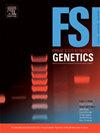Forensic SNP genealogy inference using whole genome sequencing data of varying depths
IF 3.1
2区 医学
Q2 GENETICS & HEREDITY
引用次数: 0
Abstract
High-density single nucleotide polymorphism (SNP) genotyping data at varying depths were obtained through whole genome sequencing (WGS). The accuracy of genotyping was evaluated, and methods for forensic SNP genealogy inference using WGS data were explored. The impact of sequencing depth on the accuracy of forensic genealogy inference was also assessed. Samples were sequenced at autosomal depths of 30 × , 14 × , 8 × , and 4 × using the MGISEQ-200RS platform, extracting 645,199 autosomal SNP loci referring the SNP chip panel. After quality control, the Identity by Descent (IBD) algorithm was used to calculate kinship and analyze the biogeographic origin of the samples. The consistency rate of SNP genotyping between sequencing data and SNP chip data exceeded 96.00 %. The IBD algorithm accurately predicted kinship from 1st to 7th degree using autosomal depths of 30 × , 14 × , and 8 × , with one false negative at the 7th degree in 8 × data. The accuracy of SNP genealogy inference from 30 × , 14 × , and 8 × WGS data was not significantly different from that obtained from the SNP chip (p-values: 0.93, 0.83, and 0.54). For 4 × depth data, improvements in quality control and algorithm optimization are needed to enhance genealogy inference accuracy. Additionally, SNP-based biogeographic inference from WGS data were consistent with survey results.
利用不同深度的全基因组测序数据进行法医SNP谱系推断
通过全基因组测序(WGS)获得不同深度的高密度单核苷酸多态性(SNP)基因分型数据。评估了基因分型的准确性,并探讨了利用WGS数据进行法医SNP谱系推断的方法。测序深度对法医家谱推断准确性的影响也进行了评估。使用MGISEQ-200RS平台对样品进行常染色体深度30 × ,14 × ,8 × 和4 × 的测序,参考SNP芯片面板提取645,199个常染色体SNP位点。经质控后,采用血统识别(Identity by Descent, IBD)算法计算亲缘关系,分析样品的生物地理来源。测序数据与SNP芯片数据的SNP基因分型一致性超过96.00 %。IBD算法利用常染色体深度30 × 、14 × 和8 × 准确预测1 ~ 7度亲缘关系,在8 × 数据中7度有1个假阴性。30个 × 、14个 × 和8个 × WGS数据的SNP家谱推断准确性与SNP芯片的结果无显著差异(p值分别为0.93、0.83和0.54)。对于4 × 深度数据,需要在质量控制和算法优化方面进行改进,以提高家谱推断的准确性。此外,WGS数据中基于snp的生物地理推断与调查结果一致。
本文章由计算机程序翻译,如有差异,请以英文原文为准。
求助全文
约1分钟内获得全文
求助全文
来源期刊
CiteScore
7.50
自引率
32.30%
发文量
132
审稿时长
11.3 weeks
期刊介绍:
Forensic Science International: Genetics is the premier journal in the field of Forensic Genetics. This branch of Forensic Science can be defined as the application of genetics to human and non-human material (in the sense of a science with the purpose of studying inherited characteristics for the analysis of inter- and intra-specific variations in populations) for the resolution of legal conflicts.
The scope of the journal includes:
Forensic applications of human polymorphism.
Testing of paternity and other family relationships, immigration cases, typing of biological stains and tissues from criminal casework, identification of human remains by DNA testing methodologies.
Description of human polymorphisms of forensic interest, with special interest in DNA polymorphisms.
Autosomal DNA polymorphisms, mini- and microsatellites (or short tandem repeats, STRs), single nucleotide polymorphisms (SNPs), X and Y chromosome polymorphisms, mtDNA polymorphisms, and any other type of DNA variation with potential forensic applications.
Non-human DNA polymorphisms for crime scene investigation.
Population genetics of human polymorphisms of forensic interest.
Population data, especially from DNA polymorphisms of interest for the solution of forensic problems.
DNA typing methodologies and strategies.
Biostatistical methods in forensic genetics.
Evaluation of DNA evidence in forensic problems (such as paternity or immigration cases, criminal casework, identification), classical and new statistical approaches.
Standards in forensic genetics.
Recommendations of regulatory bodies concerning methods, markers, interpretation or strategies or proposals for procedural or technical standards.
Quality control.
Quality control and quality assurance strategies, proficiency testing for DNA typing methodologies.
Criminal DNA databases.
Technical, legal and statistical issues.
General ethical and legal issues related to forensic genetics.

 求助内容:
求助内容: 应助结果提醒方式:
应助结果提醒方式:


